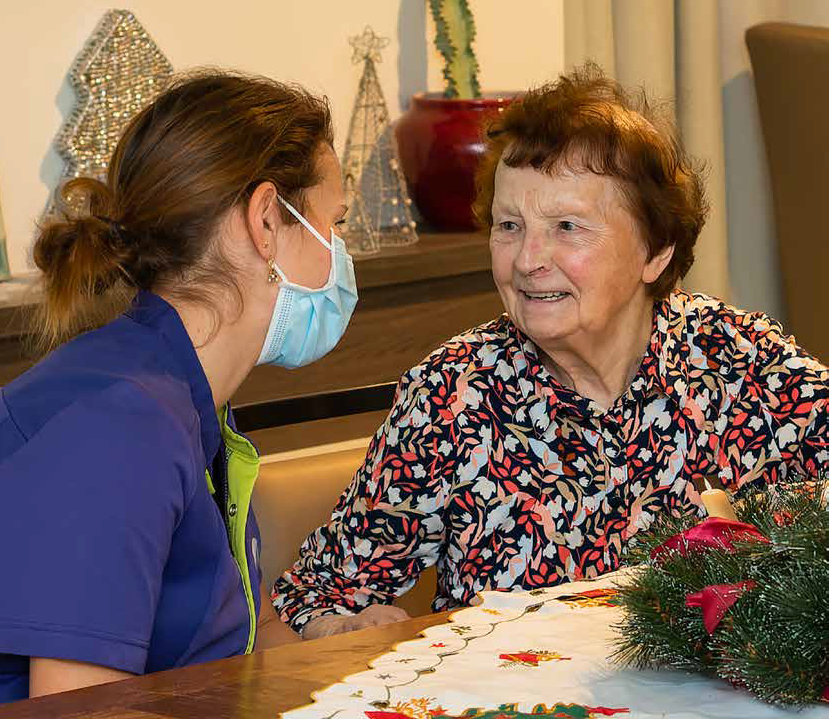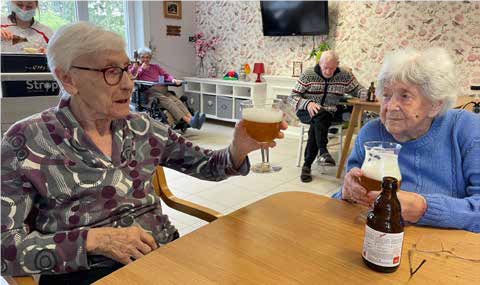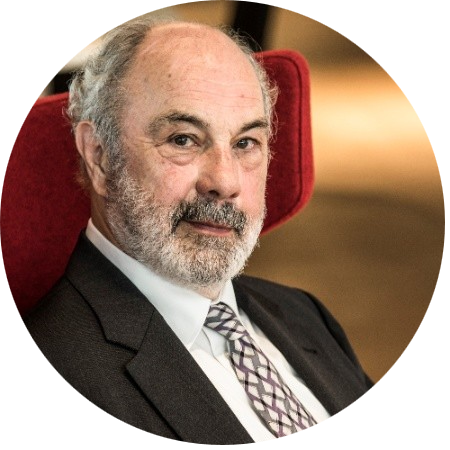The Success of Co-Creation in Residential Care Centres
Workplace innovation at its best
Innovative Work Organisation in Residential Care Centres (IWO in RCC) is a special programme in Flanders. The Minister for Welfare, Public Health, Family and Poverty Reduction (WPFP) took the initiative and is responsible for financing. The programme simultaneously tackles quality of care and workable work (the Flemish expression for job quality), does this together with employees and their supervisors, and is aimed at the entire sector. The start was at the end of 2019 and of course there was a delay due to the Covid pandemic. As a result, the RCC also had other things on their mind. Interestingly, some RCC directors reported that the implementation of IWO helped them deal with the crisis better. The reverse also happened: “In times of crisis, self-organisation has been given a boost” (RCC Sint-Jozef in Wommelgem).
The closing event was on 22nd February 2022, unfortunately online but with almost 400 participants. RCC told how far they had come and what other organisations can learn from it. The enthusiasm was great. There are clear differences in the strategic goals on which the RCC builds (depending on the region, neighbourhood and residents), in how residents are divided into care groups (living in the same hallway, same condition, age), and in how the RCC creates multifunctional self-managing teams from the different professional groups.

The first results of the accompanying research were presented. Many jobs have become broader: “We now have more tasks than before, but they are also much more varied. That makes the job more exciting” (employee, RCC Sint-Jozef in Kessel). Employees can participate more often in the decision-making process: “Since we have been involved in the team meetings, we know what is going on in our residential care center. We can now look beyond the boundaries of our own job” (another employee, RCC Sint-Jozef in Kessel). Minister Wouter Beke (Flemish Minister of WPFP) spoke highly of the managers, employees and advisors. He indicated that he was seriously considering the possibilities of new government support for a follow-up process.
In 2019, 20 RCCs started an IWO trajectory (the Starters), 12 RCCs were already working on IWO (the Advanced) and 95 RCCs benefitted over time from the knowledge sharing at the level of the provinces (the Scouts). Workitects had recruited 8 advisors with IWO experience for this project, and they were in turn supervised by Workitects project leaders Sabine Van Houdt, Lieven Eeckelaert and Frank de Craecker.
Workitects, a EUWIN partner, is a centre of expertise located in Leuven, Belgium. It emerged in 2019 from Flanders Synergy (2009 – 2019). Workitects helps organisations to become more decisive and to create more workable work (Welkom | Workitects). Their approach is one of research-based consultancy, underpinned by the socio-technical design theory of Ulbo de Sitter and the Job Demands-Control-Support model of Robert Karasek. This structural dimension focuses on the characteristics of the type of work done within an organisation. Structural choices determine the workability of an organisation, but more is needed than that. In addition, the cultural dimension highlights the characteristics of the people in that organisation. It is about the stories, norms, values and behaviour patterns of people, which make them feel motivated and involved, to a greater or lesser extent, with the objectives and leadership of their organisation. Cultural building blocks help to make a community out of a chance grouping of people.
The government, employers, employees and residents’ organisations together form the Steering Committee. Progress is not only monitored on the basis of excellent reports and explanations from the programme leaders, and there are always interesting discussions about problems and the future of the sector. The fact that meetings take place at the locations of centres helps in this regard.
Trade union members have their own ‘learning network’ and regularly hold evaluation meetings from which critical voices are fed back to the Steering Committee. Independent consultants, who work in the programme under the leadership of Workitects, exchange experiences in peer meetings and are willing to share methods despite the fact that they are competitors in the consultancy market. They substitute for each other in the case of absence. It is also a distinctive feature that there is funding not only for the supervision of the RCC, but also for research. On the one hand, this should map the progress and, on the other, lead to more knowledge about this type of change process.
An approach like this is quite unique. The ‘Arbeit 2020′ programme in North Rhine-Westphalia (NRW) could be another example. In my opinion, the success factors can be found in the Region of Flanders itself. Employers’ and employees’ organisations have already agreed on what constitutes workable work and have made agreements about measuring the state of affairs (the Vilvoorde Pact), a task allocated to the Innovation and Work Foundation. Results are discussed in the Social and-Economic Council of Flanders (SERV).
The Flemish trade unions, together with the University of Antwerp and with an ESF subsidy, published their own IWO manual. The establishment of Flanders Synergy, the predecessor of Workitects, was widely supported. Flanders has a special training course with certification for IWO advisors. IWO is well-founded theoretically and international research shows that the approach usually yields results. Flemish scientists make important contributions to this theory and research (eg KU Leuven).

Finally, legislation pays attention to psychosocial risks at work. Representatives of the Cabinet of the Minister of WPFP and of the Agency for Care and Health are familiar with the concept of IWO. You could say – in popular jargon – that Flanders has an IWO ecosystem. Of course, not everything runs smoothly, but in case of problems and conflicts there are agreements and structures to fall back on. In my opinion, this ecosystem and this sector approach deserve to be followed in other countries, including in sectors other than healthcare. It is workplace innovation at its best.
Project site: IAO binnen de woonzorgsector | Workitects
Share This Story!

European Workplace Innovation Network (EUWIN)
EUWIN was established by the European Commission in 2013 and is now entirely supported by contributions from an international network of partners co-ordinated by HIVA (University of Leuven). EUWIN also functions as a network partner for the H2020 Beyond4.0 project.
Contact: Workplace Innovation Europe CLG (contact@workplaceinnovation.eu).
